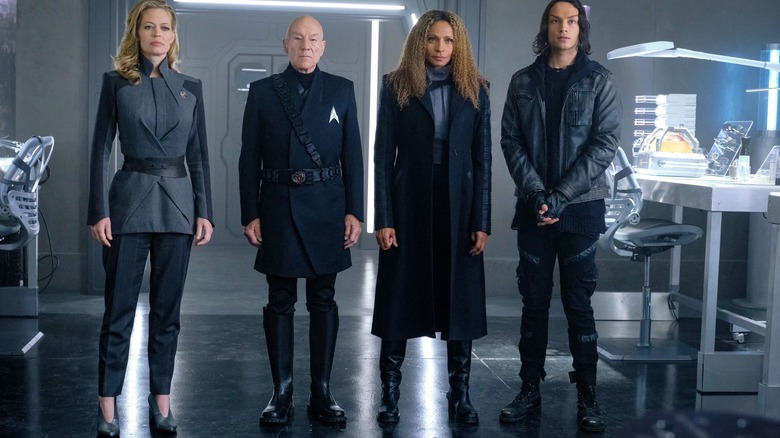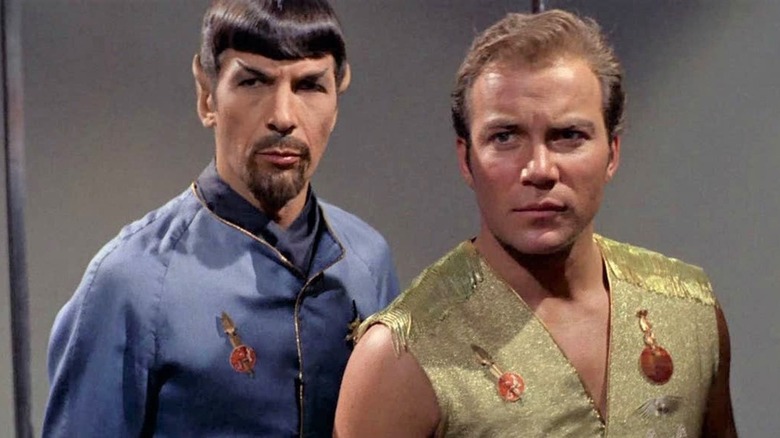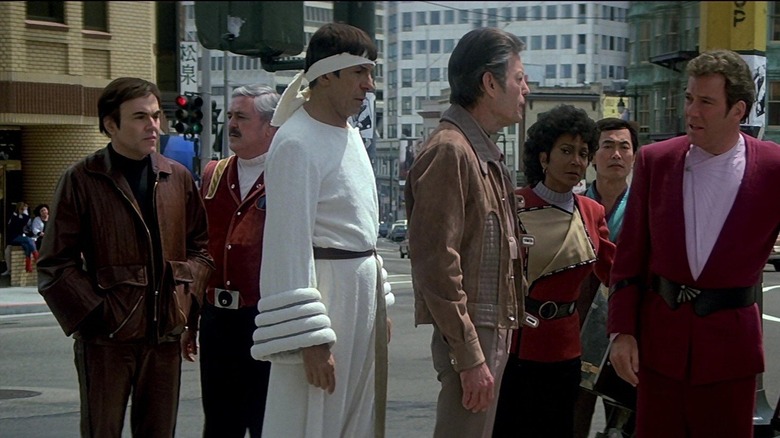Picard Season 2 Is Mirror, Mirror By Way Of The Voyage Home
The 11th episode of the seventh season of "Star Trek: The Next Generation" was called "Parallels." In it, Worf (Michael Dorn) found himself unstuck in space-time, inadvertently leaping from one parallel universe to the next. Sometimes the changes to universes were small — Worf's quarters were merely rearranged — while in others, the changes were dramatic — Worf was suddenly married to Troi (Marina Sirtis) and had children with her.
Eventually, it was revealed that reality is splitting pretty constantly, with new parallel universes being formed every few seconds. This episode is pretty fun (although it does go a long way to ruin the specialness of the characters we're following, knowing that their actions are easily undoable via dimensional portals. See also: The MCU's Multiverse), and I suspect the show's writers conceived of it to take the piss out of the increasingly common parallel universe conceits that ran through "Star Trek" since the start.
But Trek is gonna Trek, and parallel universes are still common to this day. Indeed, the 2009 reboot would not have been as widely welcomed by audiences if they hadn't already intrinsically understood that parallel timelines were already a well-established element of the franchise. As such, a parallel universe is one of the central conceits of the second season of "Star Trek: Picard," a season that is setting itself up to be equal parts "Mirror Mirror," and "Star Trek IV: The Voyage Home." Allow this wizened old Trekkie to explain what those things are to the uninitiated.
'Mirror, Mirror'
The fourth episode of the second season of "Star Trek" was called "Mirror, Mirror." It's one of the better-known episodes of the show, familiar to many who are otherwise unfamiliar with "Star Trek." In the episode, Kirk (William Shatner), Uhura (Nichelle Nichols), and Dr. McCoy (DeForest Kelley) transport through a spatial storm and find themselves on a parallel version of the Enterprise where assassination is common, and the Federation is an Imperial force dedicated to violence and conquest. Kirk, Uhura, and McCoy must find a way back to their home dimension before the evil characters around them (including Spock with a goatee) catch wise and imprison them.
The Mirror Universe is an unlikely conceit, playing more into classical fairy tale notions of mirror-image doppelgängers than anything to do with science (there is no palpable explanation as to why everyone is evil in the Mirror universe, but we accept the traditional "evil twin" conceit from ancient literature), but it was fun enough to be revisited several times. We saw the "Next Generation" crew visit the Mirror Universe in a tie-in novel, there were a few Mirror episodes of "Deep Space Nine," a wonderful two-part Mirror episode of "Enterprise," and the Mirror Universe played a major role in the first season of "Star Trek: Discovery."
While the newest season of "Star Trek: Picard" does not visit the same Mirror Universe seen in previous episodes (thanks to the events of "Deep Space Nine," we know that dramatic things have happened in that universe that preclude it from its evil), but something similar does happen. Q (John de Lancie), the trickster god, explains that humanity always possesses a tendency toward savagery and teleports Picard, and that show's cast, into a new parallel universe where — wouldn't you know it — everyone is evil. Q explains that something happened way back in the year 2024 to set humanity toward a future that included mass genocide of all known species, environmental disaster, and Picard himself being a violent, Nazi-like enforcer of humanity's murderous goals. Picard wears a black uniform and keeps the skulls of his more notable victims in his den.
This allows the characters to face their darkest selves, and have a few serious There-But-For-the-Grace-of-God moments. An "evil" universe may not be the most scientific thing, but it makes for an amusing philosophical exercise, allowing each of us to accept that our moral compass is perhaps more calibrated by our environment — and less by our personal will — than we like to think.
'The Voyage Home'
"Star Trek IV: The Voyage Home" was released in November of 1986 to enormous critical and box office success. Directed by Leonard Nimoy, the film followed our stalwart heroes back in time — on a rickety Klingon vessel — in order to retrieve a pair of humpback whales from the year 1986, bring them back to the future, and present them to a mysterious, powerful space vessel that has been draining Earth's oceans looking for them. Humpback whales are extinct in the future of "Star Trek," you see. "The Voyage Home" centered largely on the Enterprise crew lost in a time they don't understand, and much of the film's appeal comes from the fish-out-of-water humor that stems naturally from said scenario.
The second season of "Star Trek: Picard" not only repeats this premise, but mentions it in dialogue. In order to investigate the source of this evil timeline he is inhabiting, Picard — following Q's clues — must travel back in time to 2024 and investigate what went wrong with humanity. In order to do this, they need a mind as powerful as Spock's and hijack an imprisoned Borg Queen to that purpose. The U.S.S. Stargazer slingshots around the sun, and, lo, it's 2024. The third episode of "Picard" becomes a parallel of "The Voyage Home" as the crew has to solve a crisis in, essentially, the present day. "The Voyage Home" was set in San Francisco, and "Picard" is set in L.A., but the idea is the same.
Traversing the present day is also something "Trek" has done from time to time. There was a two-part episode of "Star Trek: Voyager," for instance wherein the title ship traveled back to L.A. in 1996 to catch the premiere of the movie "Fled" with Laurence Fishburne and One of the Baldwins. I mean ... match wits with a Bill Gates-like figure who is using future technology to invent CD-ROMs. That second part is real.
So the new season of "Picard" is blending the comedic and the heady into, one might hope, an intriguing story that forges its own path while hugging the conceits that made "Star Trek" what it is.


